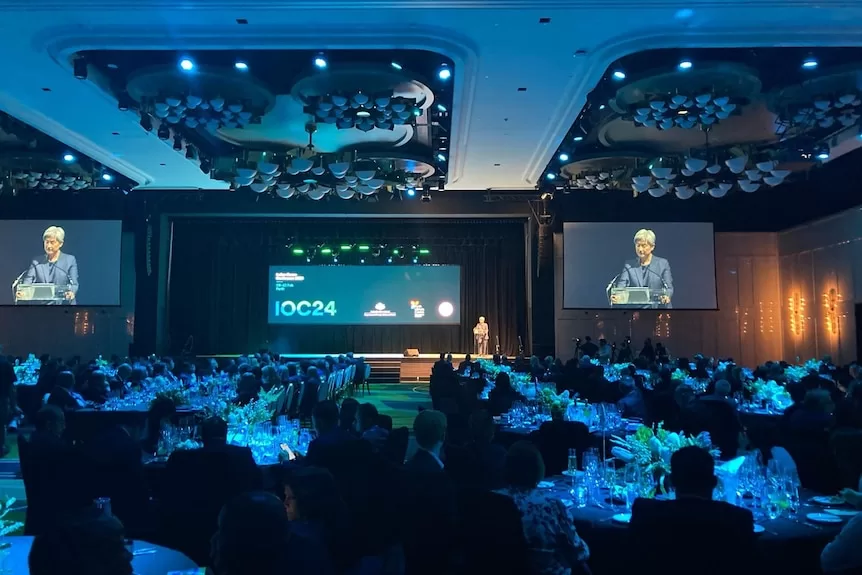The foreign minister has used a high-profile speech laying out Australia’s Indian Ocean’s strategy to warn against political interference and economic coercion, urging China to be more open about its military build-up while declaring that countries in the region are facing “unprecedented” threats from climate change and strategic competition.
Senator Penny Wong and her Indian counterpart Dr Subrahmanyam Jaishankar are currently hosting foreign ministers and senior officials from more than 20 nations at the Indian Ocean Conference in Perth, which has drawn in high level representatives from across South Asia, the Pacific, the Middle East and East Africa.
India and China are caught in an increasingly intense arm-wrestle for influence and strategic supremacy across multiple South Asian and Indian Ocean countries, and New Delhi is increasingly worried about China’s navy pushing into waters off both its eastern and western coasts.
In her keynote speech to the conference, the foreign minister said that Indo-Pacific countries “face China’s rapid military build-up without the transparency and reassurance that the region looks for from great powers”, which risked ratcheting up tensions and strategic uncertainty.
“With an increasing level of commercial and military passage through the Indian Ocean comes a greater need for the transparency and reassurance,” Senator Wong said.
“To guard against the risks of miscalculation and accident we see in other vital international waterways.
“The Indian Ocean already hosts more than a third of the world’s bulk cargo traffic and two-thirds of global oil shipments. Any slowdown or interruption, from piracy, disputes or disruptions, would have costly consequences around the world.”
Even research vessels ‘tools for strategic goals’
Indian officials have also accused Beijing of using opaque loans to bed down its influence and secure naval access in nearby countries like Sri Lanka and the Maldives.
Last month New Delhi successfully convinced Sri Lanka to block Chinese research vessels from its ports as part of a broader moratorium after India raised concerns that Beijing was intent on gathering information its submarines could exploit against India.
Senator Wong made a clear reference to those recent disputes in her speech, saying that in the current climate “even research vessels have the potential to be tools for strategic goals” and there was “an urgent need to address disinformation, interference, opaque lending practices and coercive trade measures” across the Indo-Pacific.
“In some cases, secrecy is privileged over transparency, and principles and practices of openness overlooked or abandoned,” she told the conference.
“At the same time, international rules and norms are being reshaped, with some rights or goals abandoned in pursuit of others. This all encroaches on the ability of countries to act in pursuit of their interests.”
When asked by Indian journalists if Australia would like other Indian Ocean nations to follow Sri Lanka’s example with Chinese vessels, the foreign minister said those were “sovereign choices for those nations”.
“And I would hope, in making those decisions, they could, in fact, make their own sovereign choices, their own free choice about what they believe is in the stability of the region and of their own stability,” she said.
Sri Lanka’s president, Ranil Wickremesinghe, also attended the conference. He didn’t directly reference the controversy during his speech, but said that “balancing between great powers [was] an increasingly complex task” for littoral states, and that the “space for manoeuvrability was shrinking fast”.
Influence through information
The senior director for South Asia at the White House’s National Security Council, Rear Admiral Eileen Laubacher, told journalists at the conference that Sri Lanka’s decision was a “step in the right direction”.
She also suggested that the United States, Australia and India should share more intelligence with South Asian and Indian Ocean states about China’s military and strategic aims in the region.
“I think the way to influence countries and make changes and help them to see things clearly is to provide them with information which allows them to understand better what the motivations of the PRC [People’s Republic of China] might be,” she said.
“Then they can make their own decisions in regard to their own security.”
Senator Wong also told the conference that nations with a stake in the Indian Ocean needed to “shape a regional identity” and a new “regional architecture” to help withstand these pressures.
“Throughout history we have seen small countries, at vast distances from major powers, bear the brunt of a race for dominance,” she said.
“The countries gathered here are no strangers to strategic competition – and you are also no strangers to its costs.
“As expanding military powers take a greater interest in our region, we each need to sharpen our focus, on what our interests are, and how to work together to uphold them.”
Speech a ‘significant statement of concern’
Ian Hall from the Asia Griffith Institute told the ABC that India was “concerned about China’s diplomatic influence in politically fragile states, as well as what New Delhi considers irresponsible lending”.
“It is also worried about the presence of Chinese survey vessels in the Indian Ocean, which are gathering data that might be useful for future submarine operations, as well as commercial exploitation of undersea resources.”
Dr Hall called Senator Wong’s speech “a significant statement of concern, recognising mounting anxiety in India and the Indian Ocean about China’s activities in the region”.
“It is also a statement of intent, promising more engagement by Australia,” he told the ABC.
The foreign minister also announced a host of modest new programs and initiatives, including a new virtual hub based in Perth to deepen scientific collaboration and research by Australia and India on marine ecology.
The federal government will also roll out new training programs and workshops for maritime officers from a host of states across the Indian Ocean and Europe.
Dr Hall said the new programs announced would be “welcomed” but “the region is looking to Australia for more, in terms of political support, trade and investment, and defence cooperation”.
